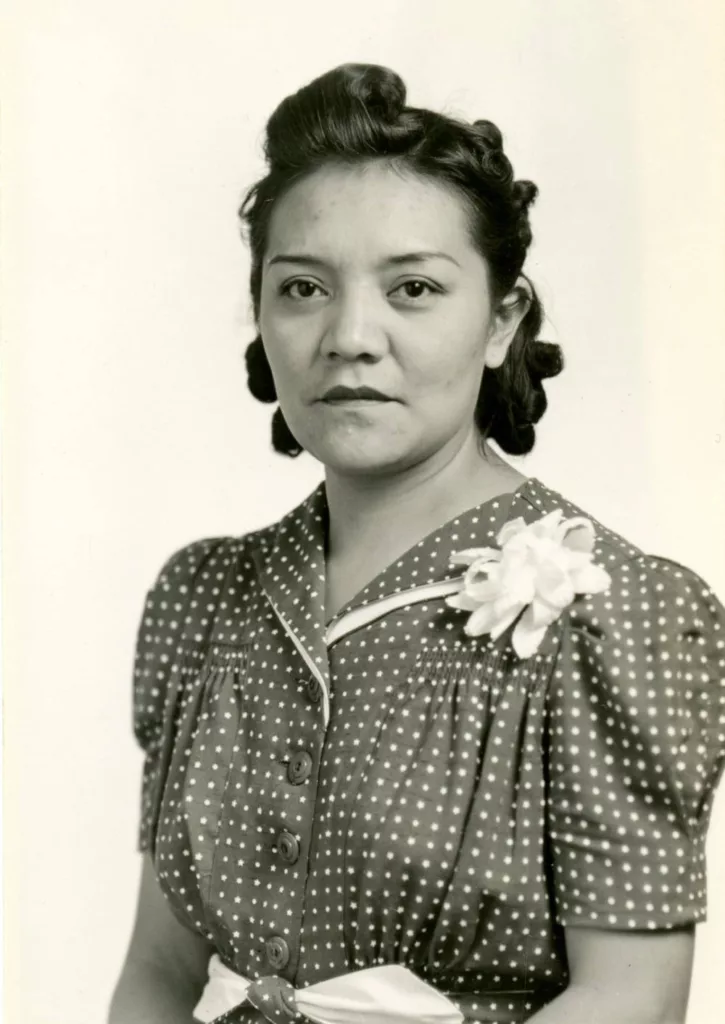There is no senior portrait for Jovita Vallecillo (B.A., ’36), the first Mexican American graduate of Colorado Agricultural College, now Colorado State University. There is, in fact, no image of Jovita Vallecillo in any of the yearbooks while she was at CAC.
Although her face is missing from CSU’s historical record, her name is etched in the 1937 commencement program, a testament to her educational journey: “Jovita Vallecillo, Economics and Sociology degree, minor in Education.” Her degree would open the door for her life’s work as a teacher, allowing her to pass on the love of learning she inherited from her parents.
Vallecillo was born in Texas in 1908. Her parents, Guillermo and Francisca Vallecillo, moved to Fort Collins in 1912, shortly after the Mexican Revolution erupted in their home country. Census records show they lived for many years with Guillermo’s brother, Gonzalo, near the vibrant Tres Colonias area of northeast Fort Collins, where many Mexican American families settled.
While their father and uncle worked in the sugar beet fields, Jovita and her younger brother, Salvador, attended school. At the time, children in beet worker families often labored in the fields and dropped out of school at a young age, so the Vallecillos’ educational opportunities were unusual.
Overcoming racial barriers
In a 2000 interview with historian Rubén Donato, Vallecillo remembered her early education as “very lonely.”
“I didn’t go outside for recess because no one would play with me,” she said. Teachers were also “very harsh” with Mexican students.
Instead, she read voraciously, practiced writing, and excelled in classes.
Outside school, Vallecillo faced discrimination too. Many local businesses posted signs that read “No dogs or Mexicans.”
Despite racial barriers, in 1928, Vallecillo graduated from Fort Collins High School (as “Hazel Vallecillo”), the first Mexican American to do so. “I don’t know how that happened,” she told Donato. “It was not the teachers. It was my family. My mother always told me I could go to school.”

Encouraged by her family, Vallecillo began attending college and paid for her tuition (and later her brother’s) by working as a cook at the Northern Hotel on College Avenue.
Active on campus
Little is known about Vallecillo’s college experience, but sporadic appearances of her name in the student newspaper show that she was engaged on campus. She was a member of Pi Gamma Mu, a social sciences honor society; the Cosmopolitan Club, a multicultural student group; and the Newman Club, a Catholic student group. Vallecillo is also mentioned in a local newspaper as a Spanish interpreter for two murder cases in Fort Collins, including her own uncle’s unsolved murder in 1932.
In 1996, 60 years after her graduation, CSU’s El Centro, the student diversity program that supports Latinx students, honored Vallecillo and her brother’s historic college graduations with an Achievement Award. In an interview with the Coloradoan for the award, Vallecillo described her personal philosophy that had helped her stay positive and persevere: “Hang your wagon to a star. Otherwise, you might not get anywhere.”
Love of learning
After college, Vallecillo’s star led her to New Mexico. She married Joseph Lobato and had two children. Around 1950, they settled in Santa Fe, where she taught elementary school for 23 years. In 1964, Vallecillo earned her master’s degree in education at the University of the Pacific in Stockton, California. She retired from teaching in 1973 and passed away in 2005.
As a teacher, she passed her love of learning onto countless children. At her 90th birthday party, she reflected on her approach to teaching: “I always try and make them [students] feel if they have the ability to learn, they can learn.”
PHOTOS: Fort Collins Museum of Discovery